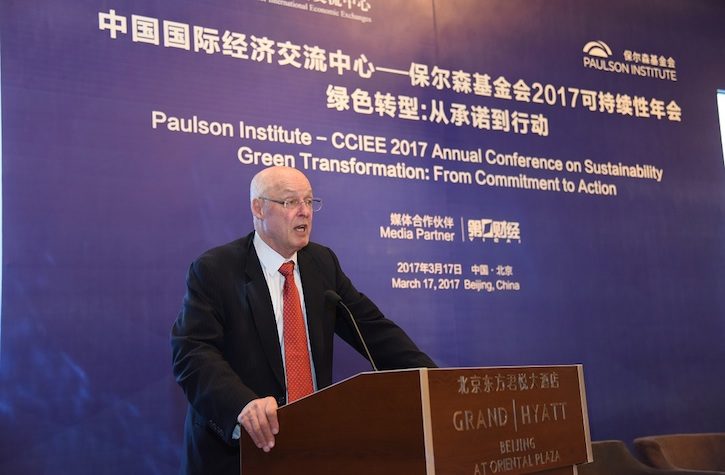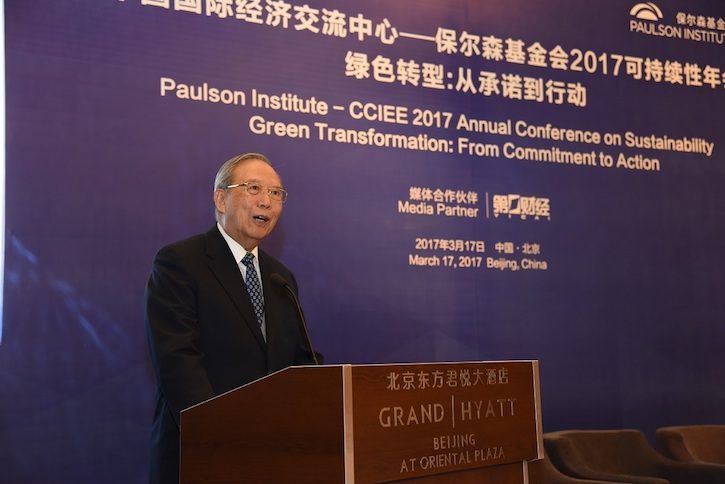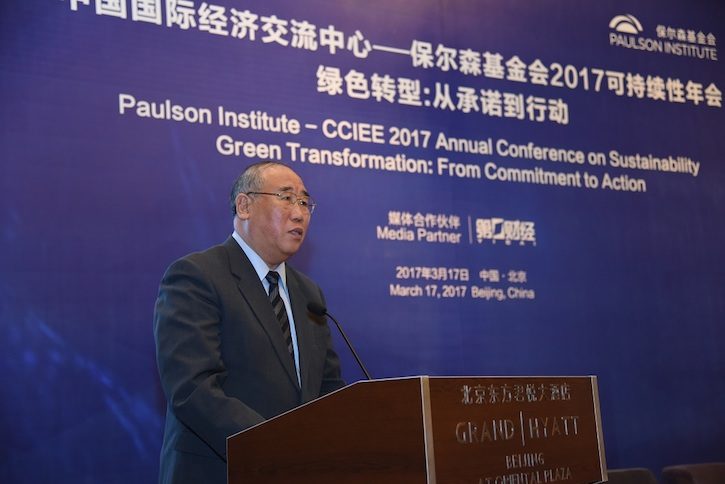
The Paulson Institute and China Center for International Economic Exchanges (CCIEE) today held its annual conference on sustainability. Paulson Institute Chairman Henry M. Paulson, Jr., CCIEE Chairman Zeng Peiyan, Special Representative on Climate Change Affairs Xie Zhenhua, and top U.S. and Chinese experts and officials discussed opportunities and challenges China faces as it undertakes its transition to a green economy.
“China is urbanizing at an unprecedented rate: In just one decade, the country has used more concrete to build cities than the U.S. used in the entire 20th century,” Paulson said. “Given this speed and scale, which is happening even as the government is working to mitigate the impacts of climate change, there is tremendous opportunity for China to show leadership on sustainability.”

“China’s urbanization plans require innovative thinking on a range of areas critical to meeting our climate commitments, from scaling up energy efficiency to low-carbon regional planning and the preservation of nature as a guarantor of crucial eco-system services,” said CCIEE Chairman Zeng Peiyan. “With this conference, we hope to provide a platform for sharing best practices between business leaders, government officials, and climate and energy experts working in both countries on these important issues.”
The meeting focused on four themes: “U.S.-China business cooperation in the new era;” “promoting sustainable development through regional coordination;” “innovative market mechanisms and tools to encourage sustainable development;” and “nature’s role in urban climate resistance.”
Bloomberg Ltd. CEO Peter Grauer, State Grid Corporation of China Chairman Shu Yinbiao, and Vanke CEO Wang Shi joined a discussion about the importance of deepening U.S.-China business ties and business opportunities in promoting China’s green growth, through advanced technologies and innovative thinking. The panel was moderated by China Business News Deputy Editor Yang Yanqing.
A panel on innovation and regional development focused on how regional economies in the United States, such as the San Francisco Bay Area, have coordinated development to become leaders of innovation and collaboration. The panel featured experts on the San Francisco Bay Area, the Yangtze Economic Belt Ecosystem, the Guangzhou-Hong-Kong-Macau Bay region, and the Jing-Jin-Ji region.

U.S. experts David Sandalow, former Under Secretary of Energy, United States Department of Energy; Mike Carr, former Principal Deputy Assistant Secretary, U.S. Department of Energy; and Dai Fan, special advisor to the governor of California, joined Chinese energy, insurance, and financial experts for a discussion about innovative market mechanisms that can drive efficient resource allocation and environmental protection. Paulson Institute Managing Director Kevin Mo moderated the panel.
The final session addressed the concept of “natural capital”—attaching economic value to the services that nature provides—a concept that is increasingly viewed as key to achieving true urban sustainability. For China to achieve its ambitious climate commitments, it is crucial for cities to take action to both reduce carbon emissions and enhance their own climate resilience. As cities in China set up timetables for peaking emissions, many are largely focused on shifting to clean energy rather than also promoting climate resilience.
Jiang Kejun, climate and energy expert at the NDRC’s Energy Research Institute, presented on China’s carbon emissions targets, and Perrine Hamel, lead scientist on Stanford University’s Natural Capital Project, made a presentation on the role of nature in cities’ climate resilience. Lynn Scarlett, global managing director for public policy at The Nature Conservancy and former U.S. Deputy Secretary of the Interior, joined Chinese experts in a panel discussion.



